Related Research Articles
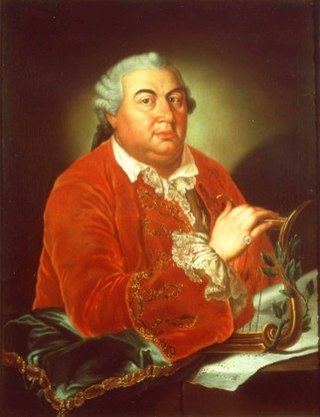
Niccolò Jommelli was an Italian composer of the Neapolitan School. Along with other composers mainly in the Holy Roman Empire and France, he was responsible for certain operatic reforms including reducing ornateness of style and the primacy of star singers somewhat.

Orfeo ed Euridice is an opera composed by Christoph Willibald Gluck, based on the myth of Orpheus and set to a libretto by Ranieri de' Calzabigi. It belongs to the genre of the azione teatrale, meaning an opera on a mythological subject with choruses and dancing. The piece was first performed at the Burgtheater in Vienna on 5 October 1762, in the presence of Empress Maria Theresa. Orfeo ed Euridice is the first of Gluck's "reform" operas, in which he attempted to replace the abstruse plots and overly complex music of opera seria with a "noble simplicity" in both the music and the drama.

Alceste, Wq. 37, is an opera by Christoph Willibald Gluck from 1767. The libretto was written by Ranieri de' Calzabigi and based on the play Alcestis by Euripides. The premiere took place on 26 December 1767 at the Burgtheater in Vienna.
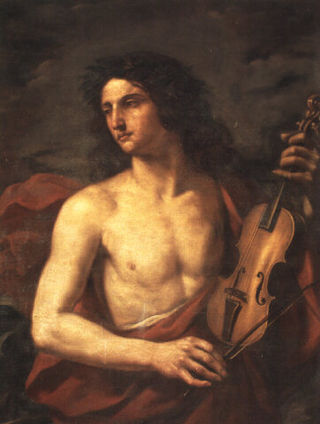
L'Orfeo, or La favola d'Orfeo, is a late Renaissance/early Baroque favola in musica, or opera, by Claudio Monteverdi, with a libretto by Alessandro Striggio. It is based on the Greek legend of Orpheus, and tells the story of his descent to Hades and his fruitless attempt to bring his dead bride Eurydice back to the living world. It was written in 1607 for a court performance during the annual Carnival at Mantua. While Jacopo Peri's Dafne is generally recognised as the first work in the opera genre, and the earliest surviving opera is Peri's Euridice, L'Orfeo is the earliest that is still regularly performed.
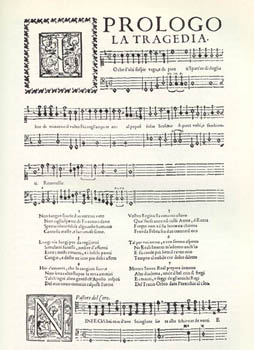
Euridice is an opera by Jacopo Peri, with additional music by Giulio Caccini. It is the earliest surviving opera, Peri's earlier Dafne being lost. The libretto by Ottavio Rinuccini is based on books X and XI of Ovid's Metamorphoses which recount the story of the legendary musician Orpheus and his wife Euridice.
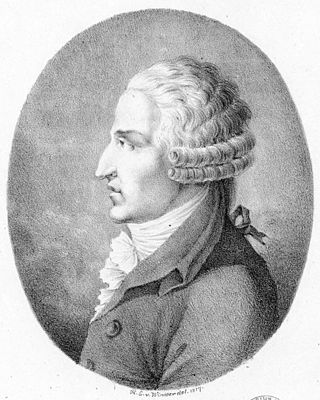
Pasquale Anfossi was an Italian opera composer. Born in Taggia, Liguria, he studied with Niccolò Piccinni and Antonio Sacchini, and worked mainly in London, Venice and Rome.
Paride ed Elena is an opera by Christoph Willibald Gluck. It is the third of Gluck's so-called reform operas for Vienna, following Orfeo ed Euridice and Alceste, and the least often performed of the three. Like its predecessors, the libretto was written by Ranieri de' Calzabigi. The opera tells the story of the events between the Judgment of Paris and the flight of Paris and Helen to Troy. It was premiered at the Burgtheater in Vienna on 3 November 1770.
Ranieri de' Calzabigi was an Italian poet and librettist, most famous for his collaboration with the composer Christoph Willibald Gluck on his "reform" operas.

Ferdinando Gasparo Bertoni was an Italian composer and organist.
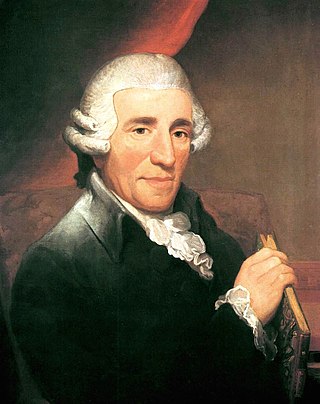
L'anima del filosofo, ossia Orfeo ed Euridice, Hob. 28/13, is an opera in Italian in four acts by Joseph Haydn, the last he wrote. The libretto, by Carlo Francesco Badini, is based on the myth of Orpheus and Euridice as told in Ovid's Metamorphoses. Composed in 1791, the opera was never performed during Haydn's lifetime.
Orfeo (Orpheus) is an opera in three acts, a prologue and an epilogue by the Italian composer Luigi Rossi. The libretto, by Francesco Buti, is based on the myth of Orpheus and Eurydice. Orfeo premiered at the Théâtre du Palais-Royal in Paris on 2 March 1647. It was one of the earliest operas to be staged in France.
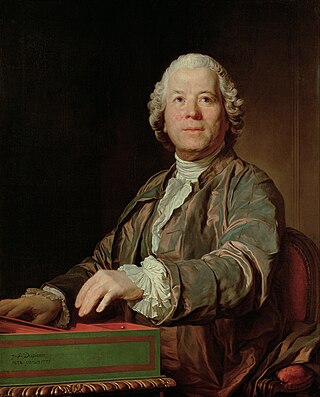
Don Juan ou Le Festin de Pierre is a ballet with a libretto by Ranieri de' Calzabigi, music by Christoph Willibald von Gluck, and choreography by Gasparo Angiolini. The ballet's first performance was in Vienna, Austria on Saturday, 17 October 1761, at the Theater am Kärntnertor. Its innovation in the history of ballet, coming a year before Gluck's radical reform of opera seria with his Orfeo ed Euridice (1762), was its coherent narrative element, though the series of conventional divertissement dances in the second act lies within the well-established ballet tradition of an entr'acte effecting a pause in the story-telling. The ballet follows the legend of Don Juan and his descent into Hell after killing his inamorata's father in a duel.
These lists show the audio and visual recordings of the opera L'Orfeo by Claudio Monteverdi. The opera was first performed in Mantua in 1607, at the court of Duke Vincenzo Gonzaga, and is one of the earliest of all operas. The first recording of L'Orfeo was issued in 1939, a freely adapted version of Monteverdi's music edited by Giacomo Benvenuti, given by the orchestra of La Scala Milan conducted by Ferrucio Calusio. In 1949 the Berlin Radio Orchestra under Helmut Koch recorded the complete opera, on long-playing records (LPs). The advent of LP recordings was, as Harold Schonberg later wrote, an important factor in the postwar revival of interest in Renaissance and Baroque music, and from the mid-1950s recordings of L'Orfeo have been issued on many labels. Koch's landmark version was reissued in 1962, when it was compared unfavourably with others that had by then been issued. The 1969 recording by Nicholas Harnoncourt and the Vienna Concentus Musicus, using Harnoncourt's edition based on period instruments, was praised for "making Monteverdi's music sound something like the way he imagined". In 1981 Siegfried Heinrich, with the Early Music Studio of the Hesse Chamber Orchestra, recorded a version which re-created the original Striggio libretto ending, adding music from Monteverdi's 1616 ballet Tirsi e Clori for the Bacchante scenes. Among more recent recordings, that of Emmanuelle Haïm has been praised for its dramatic effect. The 21st century has seen the issue of an increasing number of recordings on DVD and Blu-ray.

Le feste d'Apollo is an operatic work by Christoph Willibald von Gluck, first performed at the Teatrino della Corte, Parma, Italy, on 24 August 1769 for the wedding celebrations of Ferdinand, Duke of Parma and Archduchess Maria Amalia of Austria.

The history of opera in the Arabic-speaking world is generally viewed to have started from the premiere of Verdi's Aida in Cairo at the Khedivial Opera House in 1871, though Verdi's opera was sung in Italian.

Orfeo dolente is an opera by Domenico Belli to a libretto by Gabriello Chiabrera, an example of "representative style" of the early Baroque era. The work is divided into five interludes which were performed for the first time as intermedi in a performance of Torquato Tasso's play Aminta at the Palazzo della Gherardesca in Florence in 1616.
References
- ↑ "OPERAtion Orfeo -Myth, Memory and perception" . Retrieved 2009-07-13.